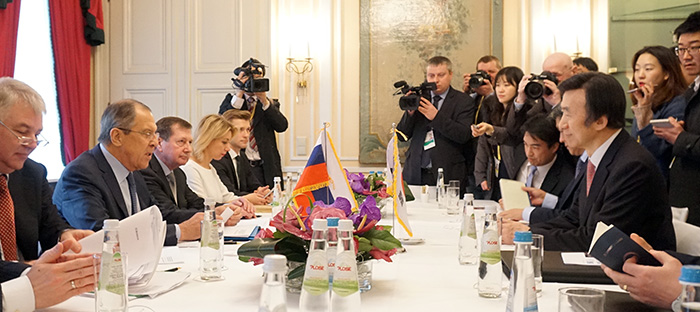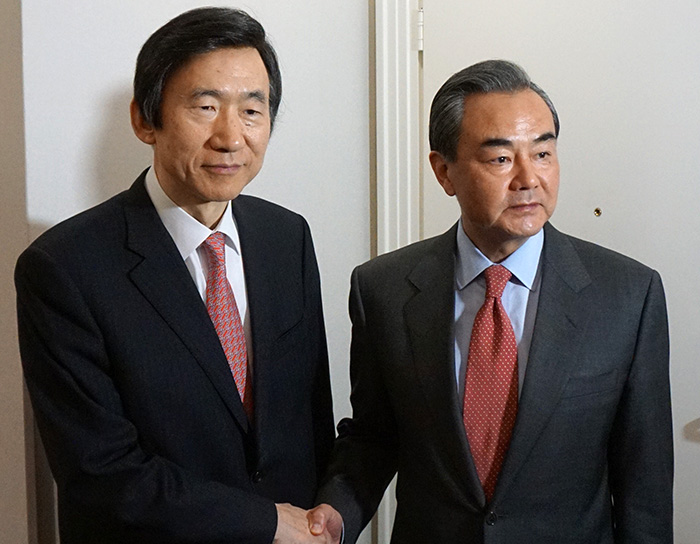
Russian Foreign Minister Sergey Lavrov (second from left) and his Korean counterpart, Yun Byung-se (right), hold bilateral talks in Munich on Feb. 18 on the margins of the Munich Security Conference.
Korea, China, Russia and the European Union (EU) have agreed to continue to strengthen their strategic cooperation on North Korean nuclear and ballistic missile threats.
Foreign Minister Yun Byung-se held bilateral talks with Russian Foreign Minister Sergey Lavrov, Chinese Foreign Minister Wang Yi, and High Representative of the EU for Foreign Affairs and Security Policy Federica Mogherini on Feb. 18 in Munich, Germany, to discuss countermeasures to Pyongyang's provocations.
Korea and Russia expressed deep concern over the fact that North Korea has shown flagrant disregard for the U.N. Security Council (UNSC) resolutions that prohibit its nuclear weapons and ballistic missile programs, while condemning the latest missile launch that came on Feb. 12.
"The latest ballistic missile launch is an indication of just how close North Korea is to the final stages of nuclear armament," said Minister Yun. "It's imperative that the international community maintain the strictest of sanctions to get across the message that Pyongyang has no other choice than denuclearization."
Minister Lavrov reaffirmed Russia's steadfast position against North Korea's nuclear weapons and missile programs, and maintained his country's commitments and obligations under UNSC Resolution 2321.

Foreign Minister Yun Byung-se (left) and his Chinese counterpart, Wang Yi, shake hands before holding bilateral talks in Munich on Feb. 18, on the margins of the Munich Security Conference.
Talks between Korea and China covered issues concerning Korea-China foreign relations, as well as the state of affairs on the Korean Peninsula.
"It's important that our two countries join forces in order to solve the North Korean nuclear weapons and missiles problem. China plays a very significant role in putting measures in place that will halt the development of Pyongyang's weapons," said Minister Yun. In response, Minister Wang affirmed the Chinese government's commitment to implementing the sanctions outlined in the UNSC resolutions.
"For the past four years, our two nations have achieved tremendous growth with the understanding that we are together in the same boat," said the Korean minister. "There may be some challenges along the way, but we will persevere and continue to grow, guided by the tides of our common history," he said.
"The Chinese government remains steadfast in its belief that our two nations should develop our relations in a stable manner," said Minister Wang.
During the talks between Korea and the EU, Minister Yun and High Representative Mogherini expressed concern over North Korea's Feb. 12 ballistic missile launch, saying that, "The provocation proves the northern regime has been accelerating its nuclear weapons development despite condemnation by the international community."
The two leaders shared the opinion that this year will mark a watershed in solving the problems of North Korea's nuclear armament.
"The EU has dutifully implemented all its obligations under the UNSC resolutions, and has led the international community in standing behind all of the imposed sanctions," said Minister Yun. "We ask the EU to continue to impose sanctions and apply diplomatic pressure so that North Korea has no choice but to give up its nuclear weapons programs," he said.
Mogherini, expressing deep concern over the acceleration of Pyongyang's nuclear and missile capabilities, said, "The EU has taken a resolute stance in fully and effectively implementing all the obligations and commitments under the UNSC resolutions. Given the circumstances, the EU will make efforts to create stronger, more concrete measures to impose sanctions on North Korea."
By Lee Hana
Korea.net Staff Writer
Photos: Ministry of Foreign Affairs
hlee10@korea.kr